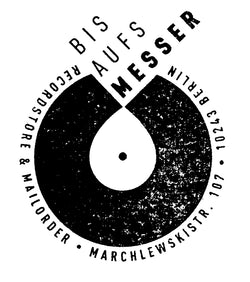It becomes apparent that time is the very question here, a time that is intangible and yet ‘absolute’ (if I may incur in this oxymoron), giving up any stringent historical temporality in favor of a sort of sedimentation in geological layers. Just listen to "Malaria C", a post-industrial landscape in the style of Lustmørd that brings to mind images of a universe in stasis, forever frozen in an ancient phase, while the voice underlines this ominous scenery, and the sound of tiny bells towards the end conjures a unique form of consolation as an ephemeral corollary.
In "Krakatoa", an extensive and vast sense of time lingers morosely in aural repetition, varying only slightly in intensity before the layered singing voices invoke an unlikely fulfillment. Those unmistakable chants may also resound in "Only A Mother", sort of a psalmody framed by a vehement and rhythmic acceleration which emphasizes how exacting and unavoidable is time's call.
Yet elusive, ungraspable time, resists being dissected into discrete and symmetrical units, escaping the prison of human perception; the drums go on and on, scanning their disparate metrics in an integral, unrestrained use of every component in the drum kit.
'I will follow the Time' could be guessed within "In Eternal Life". It is the only song which foregoes the drums. However, gongs recorded by close-miking bring to mind and ears the rumble of a synthesizer, coalescing with a jeremiad sung in a somber dialect that is cryptic, never discernible as intelligible language. The voice is merely another instrument, overlapping in disparate layers and warping polyphonic textures as its frequencies collide and clash, one against each other. While a voice recites an eerie mass, an incantation from another world, then punctuated by chants which resound like undulating drones.
It is difficult not to acknowledge the overall effect of some healthy dispossession, of a deliberate shedding of fineries, aimed at reducing everything to minimal expression. It is as if Marcelo Aguirre turns a cold shoulder to the weight of tradition and to the classification of musical experience with definite labels and overwrought categorization, as if he wanted to go beyond any accepted distinction of rhythm and melody, prose and poetry, or noise and harmony. Is his an appeal which knows of no precedent, a longing for an unheard form of music? A music able to transcend time and place while not relinquishing its human and historical fate? I cannot help taking note of a certain kinship that this musical inquiry of Aguirre's crisscrosses the time-honored obsession with Time, held by European philosophers from the late XIXth and early XXth Century. For instance, William James and his brother Henry's 'stream of consciousness', the 'durée' of Henri Bergson, and the transcendental subjectivity understood as an absolute by Edmund Husserl. What Aguirre may share with this company is the search for a language adept to communicate the indefinable, the flow of a temporality that does not allow itself to be captured in any given moment, instead it is music at the service of a primordial intuition. Therefore recovering an original order, harmonizing in a fullness of sense the flow of sounds. An attitude which positions itself at the antipodes of some developments in current electronic music, with its disassembling of the sound reality into beats (or bits and bytes), and an everlasting reiteration of artificial rhythmic structures, always monotonous and symmetrical even in their angularity. It is in this context of predominant musical tendencies nowadays, which blesses in a paradoxical marriage the once hostile fields of pop and experimentation, that these 'Contes d'Étonnement' reinvent a fresh appeal to the liberal imagination; a force as ancient (and eternal?) as the human species is. - Buenos Aires, October 2018 - Norberto CAMBIASSO

